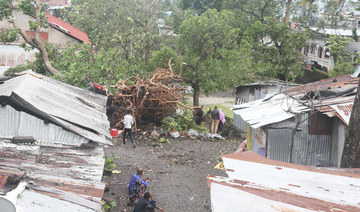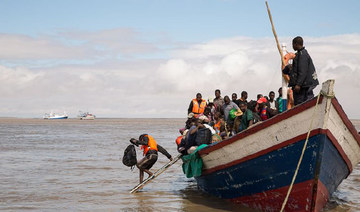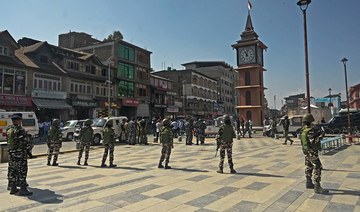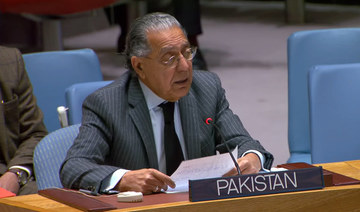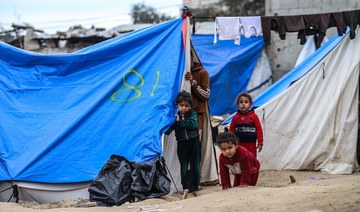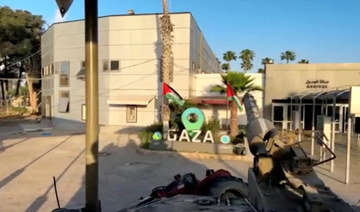PEMBA, Mozambique: Mozambique’s government urged many people to immediately seek higher ground on Saturday in the wake of Cyclone Kenneth, fearing flooding and mudslides in the days ahead as heavy rain lashed the region.
At least five people were killed, the government said. Mozambique’s disaster management agency said one person had died in Pemba city and another in hard-hit Macomia district, while residents on Ibo island said two people died there. Details on the fifth death were not immediately available.
Nearly 3,500 homes in parts of the country’s northernmost Cabo Delgado province were partially or fully destroyed, with electricity cut, some roads blocked and at least one key bridge collapsed. Some schools and health centers were damaged. Nearly 700,000 people could be at risk, many left exposed and hungry as waters rise.
“There’s a very intense strip of destruction where the wind first made impact in coastal districts,” Nicholas Finney, response team leader with the aid group Save the Children, told The Associated Press after visiting Macomia district. The team found people in shock in a region where a cyclone had never been recorded in the modern age.
Terrified children and traumatized parents “face a huge task to start to rebuild,” he said.
Rain is forecast over the next several days, and Mozambique’s meteorological authority said the storm could potentially move back out to sea and intensify again, Finney added. “It doesn’t look good, quite honestly,” he said of the risk of flooding.
As water levels rose, Mozambican authorities asked residents of Mecufi and Chiure districts and parts of Macomia and Muidumbe districts to immediately seek higher ground. Some rivers in the region have burst their banks in the past, notably in 2000.
Cyclone Kenneth arrived late Thursday, just six weeks after Cyclone Idai ripped into central Mozambique and killed more than 600 people. This was the first time in recorded history that the southern African nation has been hit by two cyclones in one season, again raising concerns about climate change .
The remnants of Kenneth, which packed the power of a Category 4 hurricane, could dump twice as much rain as Idai did last month, the UN World Program has said. Some forecasts warned of as much as 250 millimeters (9 inches) of torrential rain, or about a quarter of the average annual rainfall for the region.
The International Federation of Red Cross and Red Crescent Societies reported heavy damage to Cabo Delgado province, with the communities of Macomia, Quissanga and Mocimboa da Praia of highest concern.
“Too many small communities are completely destroyed, not a single house is standing anymore,” Saviano Abreu, a spokesman with the UN humanitarian agency, told reporters after an aerial assessment. “This will be a very complex humanitarian operation.”
Communications were challenging in some areas as authorities and aid groups scrambled to assess the damage, especially in more far-flung communities in the largely rural region. On hard-hit Ibo island alone more than 4,000 houses were damaged, administrator Issa Tarmamade told Mozambique’s disaster management agency.
“The situation wasn’t worse thanks to awareness-raising work by local authorities,” the agency said while posting photos of buildings where metal roofs had been crumpled or ripped away. Other photos from Macomia showed a mud-walled home that had disintegrated, a bus that appeared to have slid off the road and a toppled electrical pole, its wires straining.
People left homeless tried to patch together shelters from the rain.
“I’m looking for someone to lend me a porch so I can clean it up and stay with my family,” one Macomia resident, Wild Eusebio, told the Portuguese news agency Lusa.
Another family of 13 people, including eight children, was living in an improvised plastic tent, the report said.
Flooding feared in Mozambique after Cyclone Kenneth; 5 dead
Flooding feared in Mozambique after Cyclone Kenneth; 5 dead
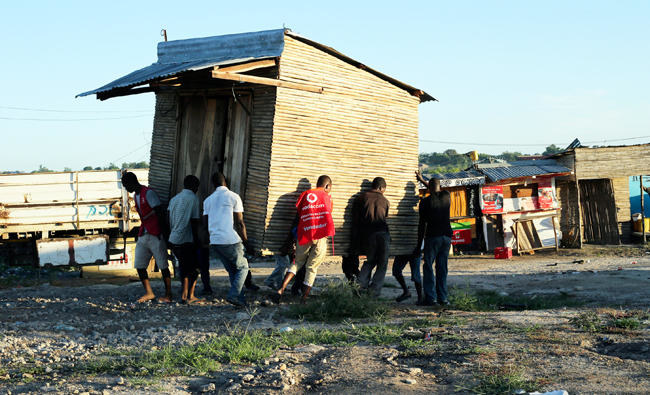
- “Too many small communities are completely destroyed, not a single house is standing anymore,” Saviano Abreu, a spokesman with the UN humanitarian agency
Two suspected Kashmir rebels killed in clash with Indian forces
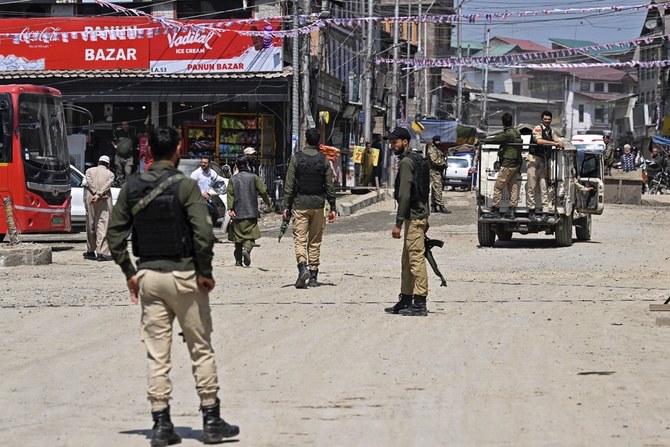
SRINAGAR, India: Two suspected rebels were killed in Indian-administered Kashmir during a firefight with soldiers, police said Tuesday, at a time when campaigning for national elections is underway in the disputed territory.
Scores of soldiers besieged a residential area in southern Kulgam district, some 70 kilometers (43 miles) from Kashmir’s biggest city Srinagar, on Monday after armed militants were suspected to be present inside a house.
Two bodies of the suspected rebels “were recovered so far” from the site, police said in a statement posted Tuesday on social media platform X.
Images from the area showed smoke billowing from a house after it caught fire during the skirmish.
Kashmir has been divided between India and Pakistan since their independence in 1947, with both claiming the Himalayan territory in full.
Rebel groups opposed to Indian rule have for decades waged an insurgency in Indian-controlled Kashmir, demanding either independence or a merger with Pakistan.
The conflict has left tens of thousands of civilians, soldiers and militants dead.
Violence and anti-India protests have drastically reduced since 2019, when Prime Minister Narendra Modi’s government canceled the Muslim majority region’s limited autonomy.
But clashes between security forces and rebel groups have increased since voting began last month in India’s six-week election.
Three suspected rebels were killed and a police officer and three soldiers wounded in three separate clashes across the territory in April.
Militants ambushed a military convoy in Kashmir’s south on Sunday, killing one Indian air force corporal and wounding four other troops.
Israeli Rafah offensive would break international law, says UK deputy foreign minister

- Andrew Mitchell warns a ground invasion could strengthen Hamas, in comments viewed as attempt to get Israel to sign up for peace deal accepted by Hamas on Monday
- UN chief Antonio Guterres urges Israel to ‘stop any escalation’ after tanks enter Rafah and army takes control of crossing on the border with Egypt
LONDON: An Israeli ground offensive in Rafah would contravene international humanitarian law and would not succeed in removing Hamas from power in Gaza or eradicating the organization, Britain’s deputy foreign minister warned on Tuesday.
Andrew Mitchell said Israeli authorities had failed to present a military plan that complies with international law, and that entering Rafah, which has become the final refuge for more than a million people displaced by fighting in other parts of Gaza, could strengthen, not weaken, Hamas.
However, he stopped short of saying what international consequences, if any, Israel might face if it proceeds.
Mitchell reiterated the UK government’s desire for a permanent, sustained ceasefire in Gaza. His comments, which followed a similar statement by authorities in France on Monday, were seen as an attempt to put pressure on Israel to sign up for a provisional, three-stage peace deal that was accepted by Hamas on Monday, The Guardian newspaper reported on Tuesday.
Israeli minister Benny Gantz has said the peace proposal did not “correspond to the dialogue that has taken place so far with the mediators and has significant gaps.”
Mitchell also echoed calls from the UN for Israel to end a renewed block on humanitarian aid entering Gaza. Also on Tuesday, UN Secretary-General Antonio Guterres called for border crossings to be reopened “immediately” so that essential aid can be delivered to Gaza. He urged Israeli authorities to “stop any escalation” after they sent tanks into Rafah early on Tuesday and the army took control of the nearby crossing on the border with Egypt.
“Things are moving in the wrong direction. I am disturbed and distressed by the renewed military activity in Rafah by the Israel Defense Forces,” Guterres said.
International pressure has been building on Israel over the potentially devastating consequences of a threatened ground invasion of Rafah, where the UN estimates about 1.4 million Palestinians are sheltering.
EU foreign policy chief Josep Borrell said such action could cause many “civilian casualties.” White House spokesperson John Kirby said that Israel told Washington its operation in Rafah “was limited and designed to cut off Hamas’s ability to smuggle weapons” into Gaza.
Egypt has urged Israeli authorities to “exercise the utmost restraint.” The Organization for Islamic Cooperation condemned Israel’s “criminal aggression.”
Berlin students protest for Gaza as demos spread across Europe
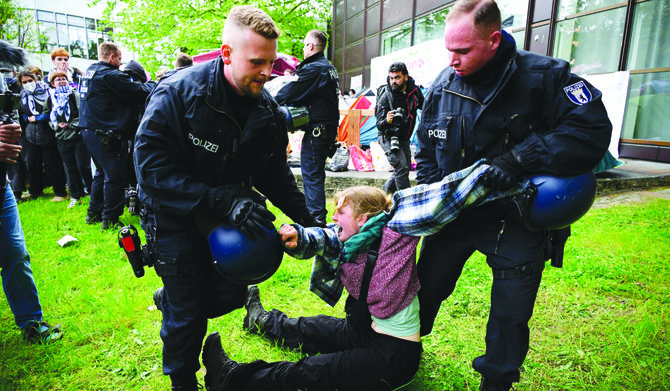
- Scuffles erupt between officers, protesters
- Crackdown on University of Amsterdam protest
- Israel has killed more than 34,700 Palestinians, most of them women and children, according to the Hamas government's Ministry of Health
AMSTERDAM: German police on Tuesday broke up a protest by several hundred pro-Palestinian activists who had occupied a courtyard at Berlin’s Free University earlier in the day, the latest such action by authorities as protests that have roiled campuses in the US spread across Europe.
Some demonstrators have even called for a break in academic ties with Israel over the war in Gaza.
In Berlin, the protesters had put up about 20 tents and formed a human chain around them. Most had covered their faces with medical masks and draped keffiyeh scarves around their heads, shouting slogans such as “Viva, viva Palestina.”
Berlin police called on the students via loudspeakers to leave the campus. Police were seen carrying some students away as scuffles erupted between officers and protesters. Police also used pepper spray against some of the protesters.
In the eastern German city of Leipzig, about 50 pro-Palestinian protesters set up tents on campus of Leipzig University and occupied a lecture hall on Tuesday afternoon.
Earlier on Tuesday, Dutch police broke up a similar pro-Palestinian demonstration camp at the University of Amsterdam. Police spokeswoman Sara Tillart said about 140 protesters were arrested, two of whom remain in custody on suspicion of committing public violence.
Amsterdam police said on the social media platform X that their action was “necessary to restore order” after protests turned violent. There were no immediate reports of injuries.
Video aired by national broadcaster NOS shows police using a mechanical digger to push down barricades and officers with batons and shields moving in, beating some of the protesters and pulling down tents. Protesters had formed barricades from wooden pallets and bicycles, NOS reported.
In Austria, protesters camped out in about 20 tents set up in the main courtyard of the University of Vienna for a second day Tuesday. With police monitoring, protesters cordoned off the encampment, which is near a memorial for Austrian Jews who perished in the Holocaust.
The University of Vienna and the main Austrian Union of Students distanced themselves from the protest. The union said “antisemitic groups were among the protest’s organizers,” which the protesters denied. Pro-Palestine protest camps have sprung up at about a dozen universities in Britain, including at Oxford and Cambridge, urging the institutions to fully disclose investments, cut academic ties with Israel and divest from businesses linked to the country.
Dozens of students have pitched up Gaza solidarity encampments on lawns outside King’s College at Cambridge University and the Pitt Rivers Museum in Oxford.
“Oxbridge’s profits cannot continue to climb at the expense of Palestinian lives, and their reputations must no longer be built on the whitewashing of Israeli crimes,” said a joint statement from protesters at the two universities.
Over 200 Oxford academics have signed an open letter supporting the protests.
In Finland, dozens of protesters from the Students for Palestine solidarity group set up an encampment outside the main building at the University of Helsinki, saying they would stay there until the university, which is Finland’s largest academic institution, cuts academic ties with Israeli universities.
In Denmark, students set up a pro-Palestinian encampment at the University of Copenhagen, erecting about 45 tents outside the campus of the Faculty of Social Sciences. The university said students can protest but called on them to respect the rules on campus grounds.
In Italy, students at the University of Bologna, one of the world’s oldest universities, set up a tent encampment over the weekend to demand an end to the war in Gaza as Israel prepared an offensive in Rafah, despite pleas from its Western allies against it. Groups of students organized similar protests in Rome and Naples, which were largely peaceful.
In Spain, dozens of students have spent over a week at a pro-Palestinian encampment on the University of Valencia campus. Similar camps were set up Monday at the University of Barcelona and at the University of the Basque Country. A group representing students at Madrid’s public universities announced it would step up protests against the war in the coming days.
In Paris, student groups called for gatherings in solidarity with Palestinians later Tuesday.
On Friday, French police peacefully removed dozens of students from a building at the Paris Institute of Political Studies, known as Sciences Po, after they had gathered in support of Palestinians.
On Tuesday, students at the prestigious institution, which counts French Premier Gabriel Attal and President Emmanuel Macron among its alumni, were seen entering the campus unobstructed to take exams as police stood.
Key debt ratio resumes rise as global debt burden hits record $315 trillion, IIF says

- The turnaround comes as dollar value of global debt surged by some $1.3 trillion quarter-on-quarter
- Pakistan is set to spend above 50 percent of its revenue on interest and Egypt more than 60 percent
NEW YORK: A key measure of world indebtedness has resumed its climb as global debt hit a record high of $315 trillion in the first quarter of the year, fueled by borrowing in emerging markets, the United States and Japan, a study showed.
The global debt-to-output ratio — a measure describing the ability of a borrower to pay back debt — rose to hit 333 percent after three consecutive quarters of decline, the Institute of International Finance (IIF) said on Tuesday in its quarterly Global Debt Monitor report.
The turnaround comes as the dollar value of global debt surged by some $1.3 trillion quarter-on-quarter.
Debt in emerging markets grew to a record of more than $105 trillion — having more than doubled over the past decade according to IIF data.
The largest contributors to the increase among emerging economies were China, India and Mexico. South Korea, Thailand, and Brazil posted the largest dollar value declines in overall debt among the subgroup, the data showed.
“Government budget deficits are still higher than pre- pandemic levels and are projected to contribute around $5.3 trillion to global debt accumulation this year,” the IIF said in a statement. “Rising trade friction and geopolitical tensions also present significant potential headwinds for debt markets.”
Interest rates were expected to have started declining in the United States by now but sticky inflation has seen the Federal Reserve stand its ground.
This has meant higher borrowing costs across the globe and, for many emerging markets, weakened currencies that further exacerbate the cost of servicing debt and “could once again bring government debt strains to the fore,” the IIF said.
Egypt and Pakistan are seen as the emerging economies where the interest expense on government debt will be highest through 2026, with Pakistan set to spend above 50 percent of revenue on interest and Egypt more than 60 percent.
Among developed economies, the United States and Japan saw debt rise the quickest, adding 17 percentage points and 4 percentage points respectively.
Japan is expected to continue to spend on average under 2 percent of government revenue in debt servicing through 2026, according to the IIF. In the US, the figure is expected to rise above 10 percent from the current 8 percent and brush against 12 percent in the same period.
Last month, the International Monetary Fund warned the US level of spending is “of particular concern” and “out of line with long-term fiscal sustainability.”
UK prime minister summons university leaders over pro-Palestinian protests
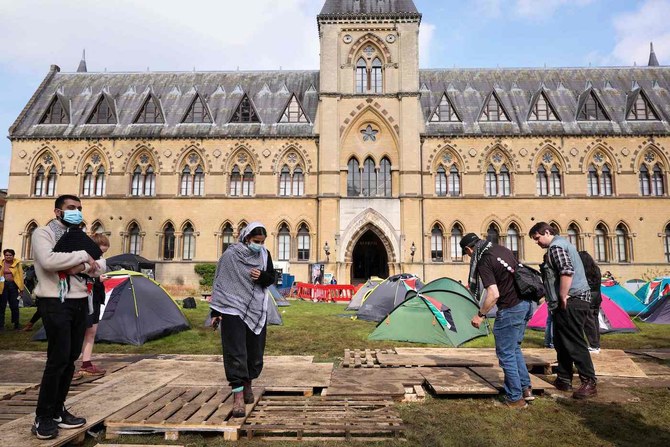
- Meeting to discuss antisemitism, ensuring Jewish students are safe
LONDON: UK Prime Minister Rishi Sunak is to summon the leaders of universities following pro-Palestinian protests that have taken place at campuses across the country.
The meeting will take place this week to discuss antisemitism on campuses and ensuring Jewish students are safe, Sunak told Britain’s Cabinet on Tuesday.
A spokesman for the prime minister said Sunak expected university leaders to take “robust action” in dealing with the protests, The Evening Standard reported.
“Our university campuses should be places of rigorous debate, but they should also be tolerant places where people of all communities, particularly Jewish students at this time, are treated with respect,” the spokesman said.
The “right to free speech does not include the right to harass people or incite violence,” he added.
The summons comes after British students set up pro-Palestinian protest encampments at Oxford and Cambridge campuses on Monday, in a show of solidarity with their American peers.
Cambridge University said its priority was the “safety of all staff and students” and that it was committed to freedom of speech.
“We will not tolerate antisemitism, Islamophobia and any other form of racial or religious hatred, or other unlawful activity,” a spokesperson said.
Pro-Palestinian protests have been taking place at US universities since April 17 and the protests have spread to Europe.
Police broke up student demonstrations in the Netherlands, Germany, and France on Tuesday as Israeli forces seized the main border crossing between Egypt and southern Gaza.



